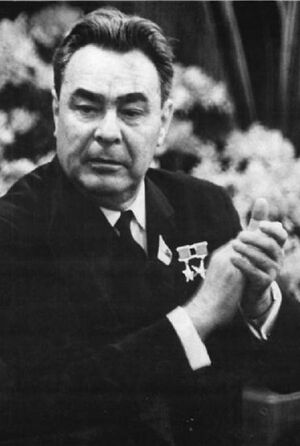Leonid Brezhnev
(Metallurgical engineer, civil servant) | ||||||||||||||||||||||||||||
|---|---|---|---|---|---|---|---|---|---|---|---|---|---|---|---|---|---|---|---|---|---|---|---|---|---|---|---|---|
 | ||||||||||||||||||||||||||||
| Born | Leonid Ilyich Brezhnev (19 December 1906 Kamenskoye, Yekaterinoslav Governorate, Russian Empire | |||||||||||||||||||||||||||
| Died | 10 November 1982 (Age 75) Zarechye, Moscow, Russian SFSR, Soviet Union | |||||||||||||||||||||||||||
| Nationality | Ukrainian | |||||||||||||||||||||||||||
| Citizenship | Soviet | |||||||||||||||||||||||||||
| Children | • Galina Brezhneva • Yuri Brezhnev | |||||||||||||||||||||||||||
| Spouse | Viktoria Brezhneva | |||||||||||||||||||||||||||
| Party | Communist Party of the Soviet Union | |||||||||||||||||||||||||||
| ||||||||||||||||||||||||||||
Leonid Ilyich Brezhnev was a Soviet politician who led the Soviet Union as General Secretary of the governing Communist Party (1964–1982) and as Chairman of the Presidium of the Supreme Soviet (1960–1964, 1977–1982). His 18-year term as general secretary was second only to Joseph Stalin's in duration. Brezhnev's tenure as General Secretary remains debated by historians; while his rule was characterised by political stability and significant foreign policy successes, it was also marked by corruption, inefficiency, economic stagnation, and rapidly growing technological gaps with the West.
Brezhnev was born to a working-class family in Kamenskoye (now Kamianske, Ukraine) within the Yekaterinoslav Governorate of the Russian Empire. After the results of the October Revolution were finalized with the creation of the Soviet Union, Brezhnev joined the Communist party's youth league in 1923 before becoming an official party member in 1929. When Nazi Germany invaded the Soviet Union in June 1941, he joined the Red Army as a commissar and rose rapidly through the ranks to become a major general during World War II. Following the war's end, Brezhnev was promoted to the party's Central Committee in 1952 and rose to become a full member of the Politburo by 1957. In 1964, he amassed enough power to replace Nikita Khrushchev as First Secretary of the CPSU, the most powerful position in the country.
During his tenure, Brezhnev's conservative, pragmatic approach to governance significantly improved the Soviet Union's international standing while stabilizing the position of its ruling party at home. Whereas Khrushchev often enacted policies without consulting the rest of the Politburo, Brezhnev was careful to minimize dissent among the party leadership by reaching decisions through consensus. Additionally, while pushing for détente between the two Cold War superpowers, he achieved nuclear parity with the United States and strengthened the Soviet Union's dominion over Central and Eastern Europe. Furthermore, the massive arms buildup and widespread military interventionism under Brezhnev's leadership substantially expanded the Soviet Union's influence abroad (particularly in the Middle East and Africa), although these endeavors would prove to be costly and would drag on the Soviet economy in the later years.
Conversely, Brezhnev's disregard for political reform ushered in an era of societal decline known as the Brezhnev Stagnation. In addition to pervasive corruption and falling economic growth, this period was characterized by an increasing technological gap between the Soviet Union and the United States. Upon coming to power in 1985, Mikhail Gorbachev denounced Brezhnev's government for its inefficiency and inflexibility before implementing policies to liberalise the Soviet Union.
After 1975, Brezhnev's health rapidly deteriorated and he increasingly withdrew from international affairs, while keeping his hold on power. He died on 10 November 1982 and was succeeded as general secretary by Yuri Andropov.